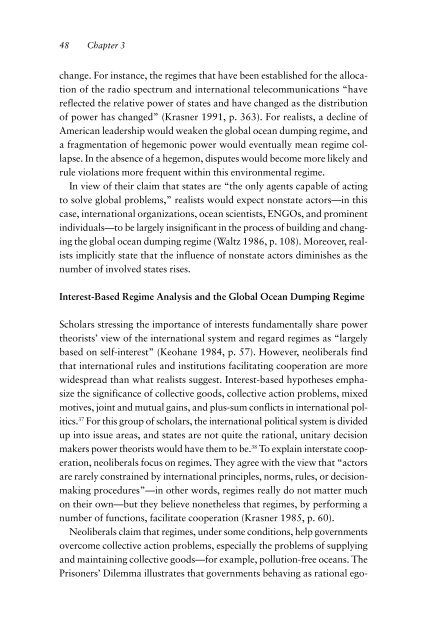Radioactive Waste Disposal at Sea: Public Ideas ... - IMO
Radioactive Waste Disposal at Sea: Public Ideas ... - IMO
Radioactive Waste Disposal at Sea: Public Ideas ... - IMO
You also want an ePaper? Increase the reach of your titles
YUMPU automatically turns print PDFs into web optimized ePapers that Google loves.
48 Chapter 3<br />
change. For instance, the regimes th<strong>at</strong> have been established for the alloc<strong>at</strong>ion<br />
of the radio spectrum and intern<strong>at</strong>ional telecommunic<strong>at</strong>ions “have<br />
reflected the rel<strong>at</strong>ive power of st<strong>at</strong>es and have changed as the distribution<br />
of power has changed” (Krasner 1991, p. 363). For realists, a decline of<br />
American leadership would weaken the global ocean dumping regime, and<br />
a fragment<strong>at</strong>ion of hegemonic power would eventually mean regime collapse.<br />
In the absence of a hegemon, disputes would become more likely and<br />
rule viol<strong>at</strong>ions more frequent within this environmental regime.<br />
In view of their claim th<strong>at</strong> st<strong>at</strong>es are “the only agents capable of acting<br />
to solve global problems,” realists would expect nonst<strong>at</strong>e actors—in this<br />
case, intern<strong>at</strong>ional organiz<strong>at</strong>ions, ocean scientists, ENGOs, and prominent<br />
individuals—to be largely insignificant in the process of building and changing<br />
the global ocean dumping regime (Waltz 1986, p. 108). Moreover, realists<br />
implicitly st<strong>at</strong>e th<strong>at</strong> the influence of nonst<strong>at</strong>e actors diminishes as the<br />
number of involved st<strong>at</strong>es rises.<br />
Interest-Based Regime Analysis and the Global Ocean Dumping Regime<br />
Scholars stressing the importance of interests fundamentally share power<br />
theorists’ view of the intern<strong>at</strong>ional system and regard regimes as “largely<br />
based on self-interest” (Keohane 1984, p. 57). However, neoliberals find<br />
th<strong>at</strong> intern<strong>at</strong>ional rules and institutions facilit<strong>at</strong>ing cooper<strong>at</strong>ion are more<br />
widespread than wh<strong>at</strong> realists suggest. Interest-based hypotheses emphasize<br />
the significance of collective goods, collective action problems, mixed<br />
motives, joint and mutual gains, and plus-sum conflicts in intern<strong>at</strong>ional politics.<br />
37 For this group of scholars, the intern<strong>at</strong>ional political system is divided<br />
up into issue areas, and st<strong>at</strong>es are not quite the r<strong>at</strong>ional, unitary decision<br />
makers power theorists would have them to be. 38 To explain interst<strong>at</strong>e cooper<strong>at</strong>ion,<br />
neoliberals focus on regimes. They agree with the view th<strong>at</strong> “actors<br />
are rarely constrained by intern<strong>at</strong>ional principles, norms, rules, or decisionmaking<br />
procedures”—in other words, regimes really do not m<strong>at</strong>ter much<br />
on their own—but they believe nonetheless th<strong>at</strong> regimes, by performing a<br />
number of functions, facilit<strong>at</strong>e cooper<strong>at</strong>ion (Krasner 1985, p. 60).<br />
Neoliberals claim th<strong>at</strong> regimes, under some conditions, help governments<br />
overcome collective action problems, especially the problems of supplying<br />
and maintaining collective goods—for example, pollution-free oceans. The<br />
Prisoners’ Dilemma illustr<strong>at</strong>es th<strong>at</strong> governments behaving as r<strong>at</strong>ional ego-

















